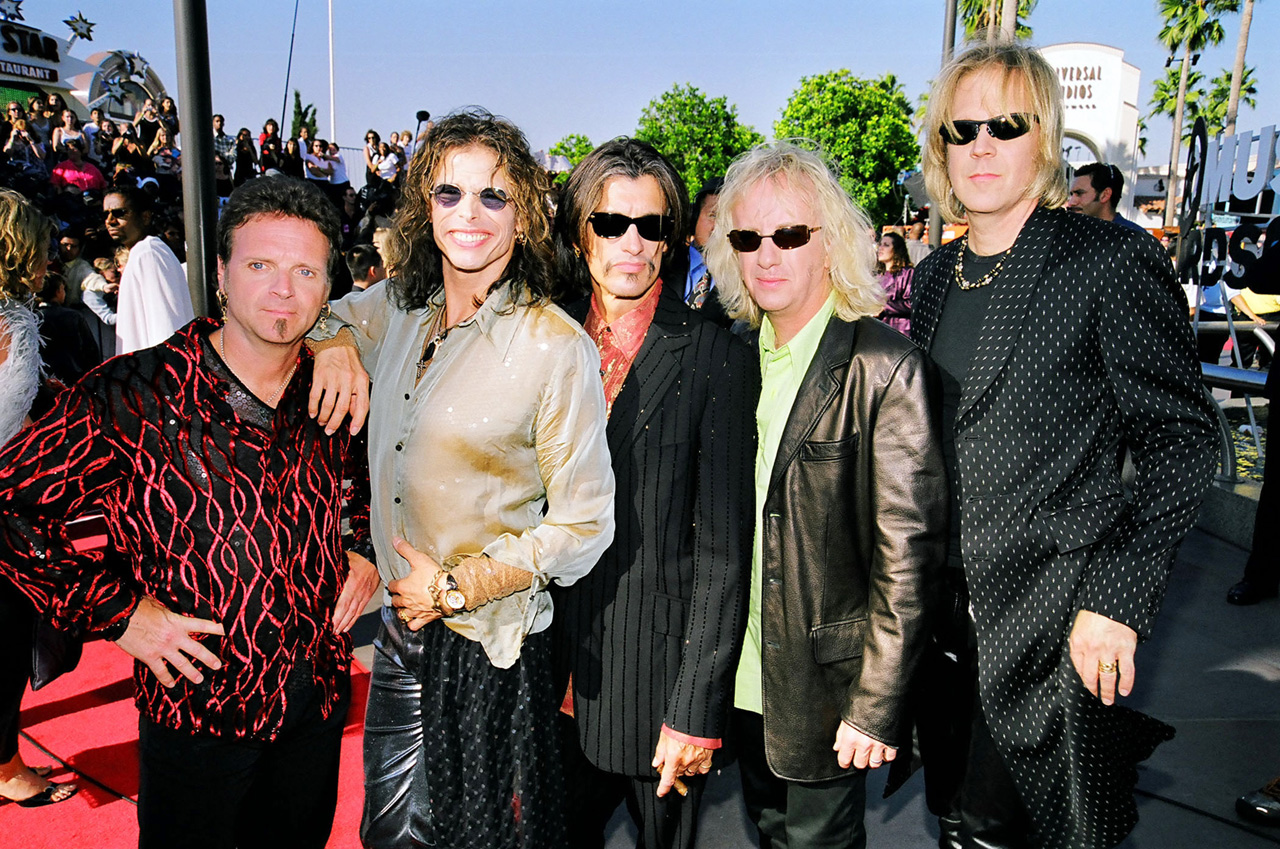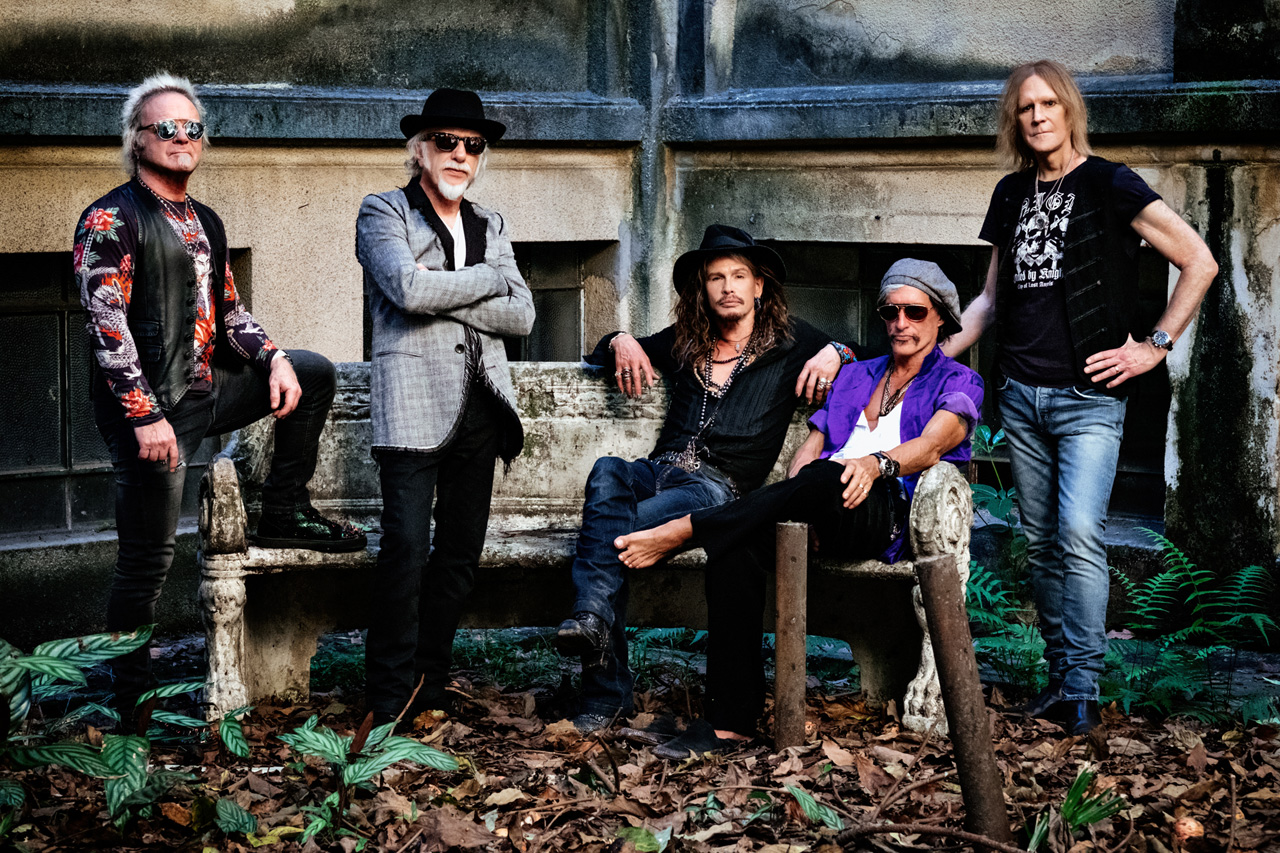As Aerosmith began work on their 12th album, the appropriately titled Nine Lives, from the outside at least they looked to be in the best shape in quite some time. The drug- and alcohol-fuelled days of the 70s and early 80s had long since been put behind them, and they’d reaped hefty rewards in the wake of their sobriety. The three albums that preceded Nine Lives – Permanent Vacation, Pump and Get A Grip – were critically lauded and, commercially, hugely successful. The Boston bad boys had, remarkably, cemented a second stint as the hottest band on the planet.
“There is a belief among musicians that if they don’t have their drugs and alcohol then they will lose their fire,” drummer Joey Kramer says of Aerosmith’s cleaning themselves up. “We completely disproved that assumption.”
But, even years after the band had kicked the booze and drugs, the battles weren’t over. Early into the 1995 sessions for Nine Lives, Kramer was struggling. In fact, he was in the midst of his own personal hell. Suffering from depression and looking for meaning, he stepped away to seek professional help. Seasoned session drummer Steve Ferrone was brought in to help track the record in Kramer’s absence, but his work was scrapped when a revitalised Kramer returned in the autumn of 1996.
“I went through a nervous breakdown, depression and anxiety,” Kramer reflects. “I came back with a nice perspective on what I bring to the table in Aerosmith. That was healthy for me. We ended up re-recording because people were listening to the tracks [for Nine Lives recorded in his absence] and were saying some negative stuff about it and saying the band didn’t sound the same.”
Fast-forward to mid-1998, and Aerosmith were coming to the end of a hugely successful world tour on the back of Nine Lives. The album had already gone double-platinum in the US and the band had won a Grammy for the previous year’s hit single Pink. The clean, sober, fit and healthy Aerosmith had their mojo back and were, once again, back in the saddle, back on top, and meaning to stay there.
But one thing still eluded them. Although they had a catalogue packed with career-defining classics, they were yet to score a number one single in the US. They ’d come mighty close, with Angel, Janie’s Got A Gun and Love In An Elevator all having made the US top five, but by the summer of 1998, a number one hit was seemingly slipping further away from their grasp.
Despite the Nine Lives album selling by the boatload, none of the singles from it had managed to crack the Top 20. It had now been eight years since their last top ten single, What It Takes, from the album Pump. But then a Hollywood-sized opportunity landed in their lap.
The scientifically baffling end-of-the-world summer blockbuster film Armageddon, starring Bruce Willis, needed a soundtrack single recorded by an A-list band. Aerosmith were the perfect choice, not least because the film co-starred Steven Tyler’s daughter, Liv. The ballad I Don’t Want To Miss A Thing, written by Diane Warren, was chosen as the track to be reworked and recorded for the film. But initially Kramer wasn’t sold on it.
“I kind of knew it was a hit, but I didn’t really like the song,” he admits. “I didn’t think that song was us. When I first heard it, it was just a demo with piano and singing. It was difficult to imagine what kind of touch Aerosmith could put on it and make it our own. When we finally did make it our own, that’s when it became what it is. It was just a question of learning the song and playing it as a band. As soon as we began playing it as a band, then it instantly became an Aerosmith song.”
Renowned hitmaker Warren was by no means the first gun for hire to write for Aerosmith, of course. Desmond Child in particular had worked well with the band since their mid-80s comeback, on songs including Dude (Looks Like A Lady) and Angel. But was working with outside songwriters a process that the band happily embraced from the get-go?

“I couldn’t answer that question because I never worked with any of the songwriters that Steven and Joe worked with,” Kramer answers. “If I had, I could have come up with some songs as well. But because of how the politics worked in the band at the time, those guys worked with the songwriters and came up with the songs. It’s not a time that I remember fondly. It would have been nice [to be more involved in the songwriting] because all of the rest of us have ideas about songs.”
Regardless of who wrote the song, the history books show that I Don’t Want To Miss A Thing was a US number one hit, and still the only one of Aerosmith’s career. Its success went hand in hand with the film’s stellar box office performance, helping to bring a younger generation of fans to a band who at that point had already been going for almost 30 years.
In doing so, another chapter was added to the big book of Aerosmith comebacks. That’s a pretty weighty tome, but this entry is particularly special for Kramer. The drummer had been lifted from the punishing depths of a nervous breakdown to the summit of the US Billboard chart. So presumably I Don’t Want To Miss A Thing is close to his heart?
“It’s okay,” he replies flatly when asked to share his thoughts on the track 19 years on from its release. “It’s just another song.”
Kramer might view it today as just another song, but back then, I Don’t Want To Miss A Thing ensured that the Nine Lives world tour kept on rolling. It eventually stretched to over two years and more than 200 dates.
“We were just about to go off the road and that song came around,” he says. “We continued to tour off that song for another year. That was welcomed by the band. At that time, that was what we did. We would be on the road for twelve or eighteen months, and the only time we came off the road was to make another record.”
“Things are a little bit different today,” he says, laughing. “We’re all a little older. I can’t do the things now that I did when I was twenty-five. But Lord knows we try. We give it a good shot!”


